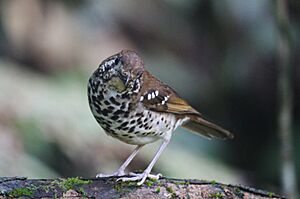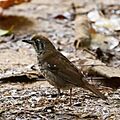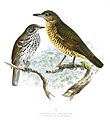Spot-winged thrush facts for kids
Quick facts for kids Spot-winged thrush |
|
|---|---|
 |
|
| An endemic Spot-winged Thrush in the Sinharaja Forest Reserve, Sri Lanka | |
| Conservation status | |
| Scientific classification |
|
| Kingdom: | Animalia |
| Phylum: | Chordata |
| Class: | Aves |
| Order: | Passeriformes |
| Family: | Turdidae |
| Genus: | Geokichla |
| Species: |
G. spiloptera
|
| Binomial name | |
| Geokichla spiloptera (Blyth, 1847)
|
|
| Script error: The function "autoWithCaption" does not exist. | |
| Synonyms | |
|
Zoothera spiloptera |
|
Script error: No such module "Check for conflicting parameters".
The spot-winged thrush (Geokichla spiloptera) is a special bird. It belongs to the large thrush family. This bird is found only in Sri Lanka, which means it is an endemic species. It is not very common.
Contents
Where the Spot-winged Thrush Lives
This thrush lives in the hill rainforests of Sri Lanka. You can also find it in drier woodlands. It prefers places that are 500 to 2000 meters high.
During winter, it moves to similar areas. These winter homes are usually 750 to 1500 meters high. They might have fewer trees.
What the Spot-winged Thrush is Like
The spot-winged thrush likes to be alone. It can be quite shy and hard to spot. It often hides in thick plants and bamboo patches.
This bird eats many different things. It is an omnivore. However, it eats more insects than fruit. It finds its food on the ground.
What the Spot-winged Thrush Looks Like
This is a medium-sized thrush. It is about 21 to 27 centimeters (8 to 11 inches) long. It weighs around 70 grams (2.5 ounces).
Its back is light brown. It has two rows of white spots on its wings. Its face is pale with two dark stripes. The belly is white with many dark spots. Its beak is black, and its legs are yellow.
The song of this bird is a beautiful, varied whistle.
Young Spot-winged Thrushes
Young spot-winged thrushes look a bit different. They have buff-colored streaks on their upper parts. Their face and belly are light brown with many streaks.
Life Cycle and Reproduction
Spot-winged thrushes build loose, cup-shaped nests. They line their nests with plants. They usually place their nests in the fork of a tree.
The female bird lays 2 to 3 eggs. The eggs can be buff or bluish-green. These birds often raise two groups of chicks each year.
In Culture
In Sri Lanka, people call this bird Pulli Wal Awichchiya. This name is in the Sinhala language.
Gallery
 | Kyle Baker |
 | Joseph Yoakum |
 | Laura Wheeler Waring |
 | Henry Ossawa Tanner |




